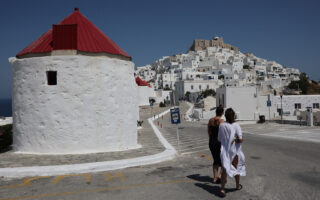Are we turning into Barcelona?

Elli and her partner made the big leap about a decade ago, giving up their jobs in Athens and moving to the Cycladic island where her family was from. It was a massive financial risk because they both worked in the private sector, earning very good salaries and with great prospects of advancement. But they were fed up with life in the city, with the long commutes, the noise, the pollution, the stress. They moved to the island and opened a shop selling top-quality local products in a prime location on the port road. Little did they know that Athens would soon be following them there.
“The road is narrow and barely fits two cars at some points. The traffic jams last all summer, starting early in the morning when the first ferry arrives and lasting well past midnight. It’s a terrible situation, with honking horns, spinning wheels, exhaust fumes, arguments and fights between the drivers, trucks getting stuck, desperate pedestrians, and servers weaving through traffic carrying laden trays to the tables on the seashore,” says Elli.
Tourism is a pillar of our economy, not a sacred cow at whose altar everything can be sacrificed
And that’s just the tip of the iceberg.
“Water is becoming dangerously scarce; it hardly rained over the winter, the desalination units are old and keep malfunctioning and scheduled cuts are already taking place. What’s more, new villas keep appearing every year, with huge swimming pools and big gardens that require a lot of watering. How is our small island supposed to carry such a huge burden?” she asks.
Earlier this month, thousands of residents in Barcelona protested against the effects of overtourism, which are making their lives unbearable. Spain is the second most popular destination in the world after France, receiving 85 million visitors last year and expecting even more in 2024. The streets in downtown Barcelona are constantly congested, rental rates have skyrocketed by nearly 70% in the past few years, water is being rationed (every resident is entitled to 200 liters a day) and small neighborhood businesses are shutting down and turning into bicycle rental shops, cafes and souvenir stores.
Greece is on the same path. Just look at what’s happening in Athens, Santorini, Paros, Naxos, Crete, Lefkada, Leros, Chios… For the Greek summer miracle to last – and not become a nightmare – the country needs infrastructure, restrictions and, most importantly, implementation of the law. Tourism is a pillar of our economy, not a sacred cow at whose altar everything can be sacrificed. Otherwise, to quote poet Michalis Katsaros, “we must take water with us, because the future will be full of drought” – and where are we to find the water?





